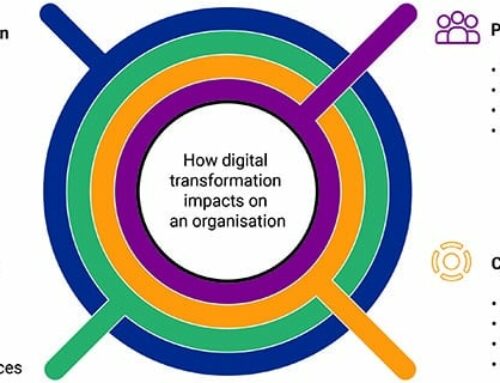Summary
Discusses the roles and competencies of digital leaders in UK higher education and highlights the benefits of producing a tailored in-house course which can support digital transformation activities
In today’s rapidly changing digital landscape, effective leadership in educational organisations requires a range of skills and competencies. Digital leadership is needed to guide and manage an organization’s digital transformation, leveraging technology to achieve strategic objectives and drive innovation. I have recently been working as a consultant with Jisc to support some UK universities with their digital transformation strategies and development plans. One of the most significant challenges for these organisations has been around the confidence and capabilities of senior leaders to lead the level of organisational and culture change that digital brings. The complexity and size of HE institutions with embedded practices and hierarchical structures often result in siloes that perpetuate traditional approaches and stifle innovation.
Effective digital leadership is required to develop, lead and achieve a strategic vision that is appropriate for each individual organisation. So it is critical to build the skills and confidence of senior leaders as well as encourage cross team working to prevent siloed approaches that may hamper digital transformation. It can be challenging for senior leaders to admit that they might not be confident in their digital capabilities. Digital leadership programmes can be one way for senior leaders to take time out to focus on their personal skills and can also stimulate conversations and sharing of ideas with other leaders in the sector.
In house digital leadership courses
Another way to support senior leaders to develop their own digital vision and encourage conversations across an organisation is to produce an in house digital leadership course, There are some advantages in this approach especially if the course offers a mixture of online asynchronous activities and in person workshop experiences. A course which offers a balance of individual reflective approaches as well as collaborative activities can be a significant booster for digital transformation progress. I recently produced a course like this for a university and this offered the following advantages:
Online self reflective activities
- Allow people to engage with digital leadership when they have time and head space
- Are non threatening to people with less confidence – they do not have to reveal their lack of skills, understanding or confidence
- Can be offered at different levels of complexity depending on their skills and confidence
- Can be linked to or contribute to creating strategies and plans – so course activities can feed into the creation of organisational, departmental or individual development plans
- Can be linked to asynchronous discussion boards where leaders can share their thoughts and discuss organisational strategies, priorities and plans outside formal meetings
Asynchronous and/or synchronous collaborative activities
- Encourage cross department sharing and planning – to break traditional siloed thinking and acknowledging diverse perspectives
- Identifies strengths and gaps in leadership capabilities and highlights areas for further development
- Can produce actionable plans, gain senior leader buy-in and create stakeholder engagement activities
- Can build trust and rapport with colleagues and stakeholders and support conflict resolution in a safe informal space
- Can use specific organisational data and tools to practice decision making in a safe environment
Impact on digital transformation
An effective, tailored in house digital leadership course could have a significant impact on the development and progress of a digital transformation strategy.
- Support the development of a clear vision of how technology can enable and transform their organization
- Support the development of a deep understanding of the organization’s strengths, weaknesses, opportunities, and threats, as well as the ability to anticipate and adapt to changes in the digital landscape
- Help leaders communicate their vision and strategy effectively to stakeholders, gaining buy-in and support for digital initiatives
- Help leaders investigate trends in the HE and technology sector and their potential applications and limitations
- Help leaders evaluate and new technologies, balancing their potential benefits against their costs and risks
- Support benchmarking and baselining
- Support the development of a culture of innovation, encouraging experimentation and risk-taking to drive continuous improvement and growth
- Help leaders challenge conventional thinking and try new approaches, as well as a foster a willingness to learn from failure and adapt quickly
Digital leadership is an essential component of effective leadership in today’s digital age. By embracing the key elements of digital leadership, including vision and strategy, digital literacy, innovation, collaboration, and data-driven decision making, leaders can guide their organizations through digital transformation and drive innovation and growth. With the right skills and competencies, digital leaders can help their organizations thrive in the digital age and achieve their strategic objectives.
I am happy to work with organisations to produce in house courses if you think this approach would work for you.







Leave A Comment